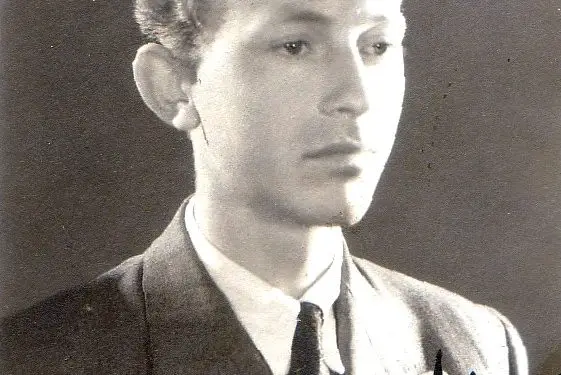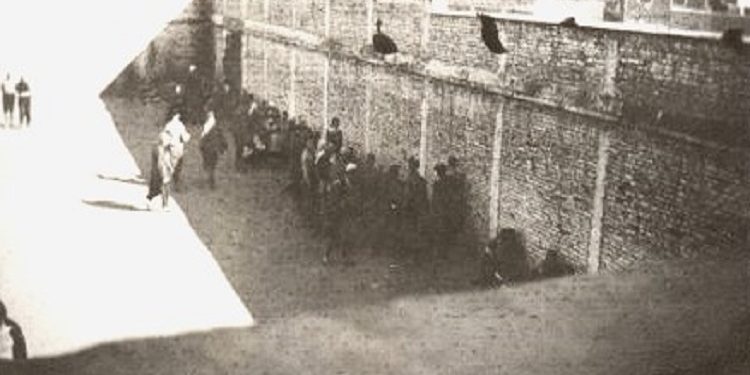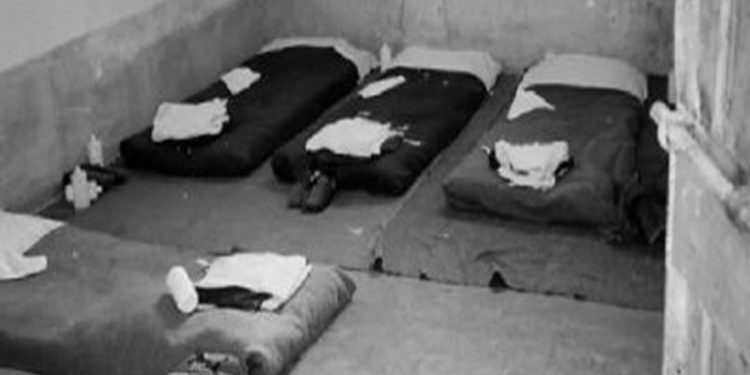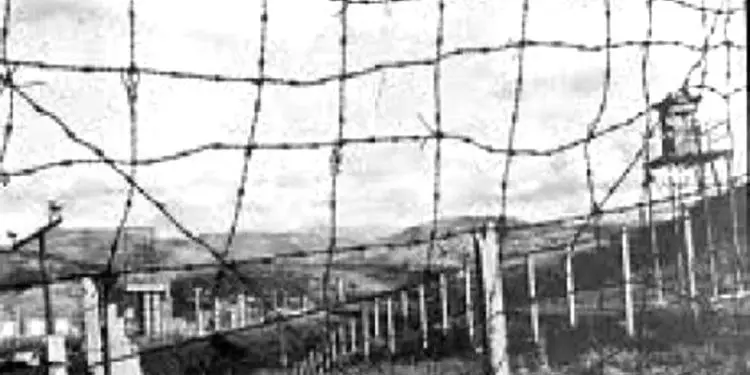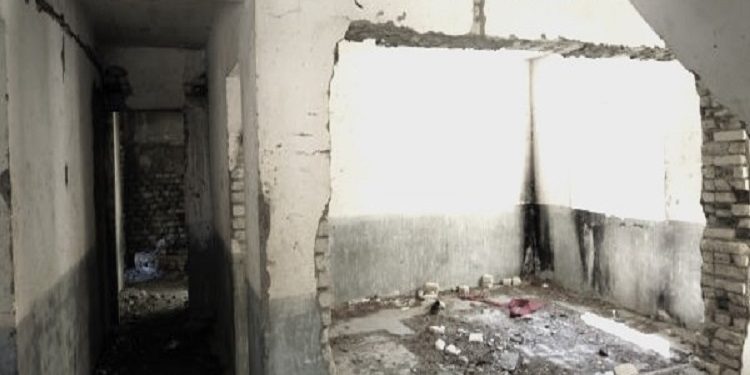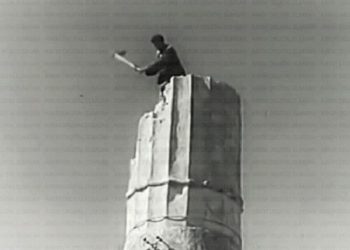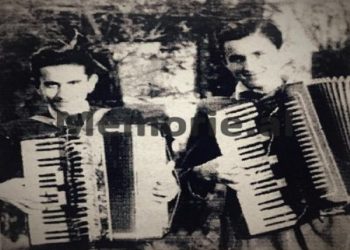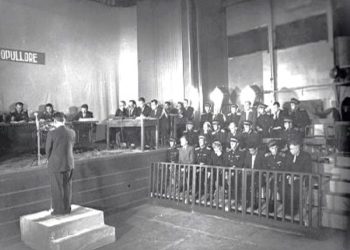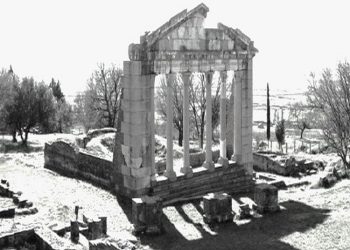By Uran Kalakulla
Part Twenty-Three
Nazism and Communism
Memorie.al / Nazism lasted 12 years, while Stalinism lasted twice as long. In addition to many common characteristics, there are many differences between them. The hypocrisy and demagogy of Stalinism was of a more subtle nature, which was not based on a program that was openly barbaric, like Hitler’s, but on a socialist, progressive, scientific and popular ideology, in the eyes of the workers; an ideology that was like a convenient and comfortable curtain to lie to the working class, to lull the sharpness of intellectuals and rivals in the struggle for power.
One of the consequences of this peculiarity of Stalinism is that the entire Soviet people, its best, capable, hardworking and honest representatives, suffered the most terrible blow. At least 10-15 million Soviets lost their lives in the KGB torture chambers, martyred or executed, as well as in the gulag camps and others like them, camps where it was forbidden to correspond (in fact, they were prototypes of the Nazi death camps); in the mines in the ice of Norilsk and Vorkuta, where people died from cold, hunger, from crushing work in countless construction sites, in the exploitation of forests, in the opening of canals and during transportation in leaded wagons, or in the flooded barns of the death ships.
Continued from the previous issue
But, to be accurate, I must say that this party of his did put him in prison, but they kept him there with a fine. That Selmani did not go to work like the others and did not sleep with the others in the bunkers. He, by special order of Qamil Mane, director of the camp Directorate, had been assigned a separate room: with a regular bed, a table and a chair, they gave him selected food from the kitchen and even a kind of salary without working.
In other words, they had created conditions for “creative work” as the “socialist realist writer” that he had been or continued to be. Thus, Selua shook his chain all day, moving around the camp. And in his case, one of the Party slogans in the mouth of the commissar was once again confirmed, that “The Party has a big heart, with one hand it hits you when you make a mistake, but extends the other hand to get you back on your feet again”! But, this work was only for Selman and his friends, not for the rest of us “vile enemies of the people”! Selman, unlike his friends of the “social class”, when they went there, did not shrink at all.
He even had the courage to meet some of his old Tirana acquaintances. He kept a distance from me, who also knew me well, and looked at me like a dog that seems sorry for having bitten you and is now afraid that you will attack it and make a mess of it. As for me, I either ignored him completely or, when he happened to come across me, I would look at him warily and turn my head away, with a clear expression of indignation on my face. I still had vivid memories of the (near-murder) he and his Communist Youth comrades did to me in the high school yard, about nineteen years ago.
Some Tirana friends begged me to talk to them, even insistently, even though I had told them my painful story with Selman. Only after many interventions did I convince him to agree to talk to me. But, this time too, not to forgive him and become friends, but just to have the opportunity to say a few words to him that burned inside me.
To be honest, they were angry, peppery words that would certainly have burned him hard, if he had been that smart. We met at one of the benches in the miserable canteen where we were eating. It wasn’t just the two of us, but also some fellow Tiranas, whose names, I swear, I can’t remember exactly. Was it Tit Muça with Abdulla Sallak or someone else, I can’t remember for sure.
He stood up and extended his hand to me, mentioning my name. His reception was clearly humble; it was a haughty, shameful submission. While I, maintaining a natural, but serious and dignified attitude, didn’t even shake his hand. I sat down next to him and spoke to him:
– “Hey, Selman Vaqarri, do you see how the fates of life are? Do you see that we have met again? But this time, you no longer have the Communist Youth behind you. They have abandoned you, you are left alone, among thieves, immorals, spies, people of the scum and the rope. Look where you’re Party has led you, in the name of which you broke away, so you shed blood for me and for many of your high school friends. That I am here is natural, because it is the logical continuation of my entire life. And you? At least I have been punished for an idea, a noble and honest idea. And you? At least I have the right to feel proud. And you?
Do you see how low your Party has brought you? In fact, it did not even consent to punish you politically, but as an unworthy ordinary, with a shameful accusation. I don’t know how true the accusations they made against you can be?! And I don’t even want to know. But, look how we ended up meeting: me and my friends, whom you beat up in high school, as a politician, because this was our path, and you, as an asshole and, moreover, as an exploiter of your unnatural desires towards a child”!
My friends were left with their eyes wide open, while Selman had lowered his head and would not raise it again. That was the scene. After that, I got up and left, leaving Selman like a corpse with his head hanging, as if someone had cut him off with a machete. It was not the coward’s fault. For someone who has a little shame or conscience left in his soul, the machete of words is supposed to be sharper than the executioner’s. Did Selman have such a thing left? For many years, I have not remembered such a thing.
In fact, it happened that I met Selman once in our days, in some alley of Tirana. He spoke to me first, greeted me and I responded only with a bow of the head, nothing more. And I would not have written this sad story about him, if I had not found out that, this Selman, had not yet shaken off the old lice, while he participated again, with the initiators who created the New Marxist-Leninist Communist Party, with the executioner Enver Hoxha as his idol again. But, it is not their fault, when the Association of Former Prisoners sleeps!
From time to time, the orderlies removed everyone. We were left with the “enemies” of the camp. And the work continued with vigor. I had to do all kinds of work in those camps: digging ditches and various holes with a pick and shovel, turning iron, parquetry, carpenter, plasterer, bricklayer, cobbler, mortar preparer, bricklayer, concrete producer in a concrete mixer, nailer, painter, limelayer, stone crusher in a crusher, and I don’t know what else. Only special jobs didn’t suit me, even though I had a good education. Apparently, I was neither trusted nor worthy of them. For example, neither assembler, nor adjuster, nor sheet metal worker, nor plumber, welder, nor electrician.
To be honest, I didn’t like these last two jobs either. They seemed dangerous to me. And by wandering around the camps for about five good years, job after job, job after job, I managed to learn a lot about construction, enough to dare to call myself, almost a kind of intermediate technician. Another job then, if this experience didn’t come in handy enough, even after I got out of prison and my further fate was only manual labor. It only came down to picking up a pickaxe or a forklift, as a worker of the last category, which they barely allowed me to get through the categorization and, to get the second category, more thanks to theory than practice.
We had only been in that camp for a couple of months, when one morning, while we were at the work facility, the automatic and machine gun suddenly went off. As always in such cases, we hid somewhere to save our heads. A huge commotion among the guards and the captains and the entire command rushed outside. What had happened? Two prisoners, young boys whom I knew well, Ylli Tabaku and Maksut Xhomaka (alias Babushi, as everyone called him), had hijacked one of the “Skoda” trucks, along with the trailer, and had escaped, destroying the entrance to the labor camp.
They had rushed to get to the national road. And from there to where? Of course, towards the border. But it was a desperate, hopeless attempt. First, because the trailer was blocked and the truck was already dragging it. Moreover, on the first bend, a very sharp bend, the trailer overturned and then the job became even more difficult. Third, on the narrow road, even the national one, if the entire State Security and the police of the whole country were alerted, where would you go? The truck with the entire trailer would become a rocket and fly?
So, the escapees were caught, tied up and brought back to the camp and, after beating them to death, they were each sentenced to a month in prison. Undoubtedly, the work of the two escapees was ill-conceived, but it was an extremely courageous and brave act, which, however, sent shivers down the spines of the command and all its subordinates. The same applies to the free engineers and technicians of the facility and the surrounding people, because we there were not only obedient and humiliated slaves of forced labor, but, first of all, we were people and among us there was Albanian blood, even much purer and nobler than that of those who had kept us among barbed wire.
It seems to me that Ylli and “Babushi” were sentenced only to prison.
Why? Had the security forces and their Party become kind-hearted? Not at all! But at that time, an unusual kind of softening was happening. The captains started to behave more gently with us. The commissioner, when he gathered us in a special gathering, told us that; The Paria and the government were preparing something big for us. “Therefore, men, finish the factory as soon as possible.” One of us, who read the newspapers very carefully, had concluded that the Chinese line was also becoming that of Enver Hoxha and his friends. And that this line was a liberal dog, where prisons were minimized at the peak. In fact, the commissioner also told us something like this when he gathered us:
– “Listen to these Moorish words that I will tell you. And I do not have them from myself, but from above. A large part of you will go to homes, but somewhat limited, as a form of internment, with appeals three times a day and without the right to leave the designated place, without the permission of the competent authorities. While a very small part will remain in prison, but with much better conditions than up to now”. I, in my mind, certainly entered the second category, where, in addition to “good conditions”, there would also be a considerable reduction in the sentence. Whatever the commissioner said, we believed him and some notified their families, so that they could get their good clothes and take the prison clothes.
At that time, euphoria and joy were triumphing in the camp and work in the factory facilities was going smoothly and quickly. It was learned that Zhou Enlai had arrived in Tirana. And just when people were impatiently waiting for him, among other things, to give the signal for “Maocedunian Liberalization,” the opposite had happened.
Chu had brought his younger and faithful brother the “joyful” news that the “Cultural Revolution” (the beautiful revolution) had broken out in China, which had undertaken to eradicate the thousand-year-old Chinese and world culture and turn the wheel of history back to primitive communism, where, instead of pagan gods, a single one would reign from now on, in the eternally veiled figure of Mao. Thus, Mao was also doing what the Russian Bolsheviks had not done, with their ugly and nihilistic proletkult.
However, it was not so much a matter of culture, that the Maoists took the blame for the world’s culture, but rather that that “Cultural Revolution” was a “carnival revolution”, that is, a carnivorous revolution, when man would eat human flesh. Even of their communist comrades, starting from former President Liu Shao Qi, to the veterans of the Chinese party, the veterans of the “Great March”, the veterans of left-leaning culture, who had been in solidarity with Mao’s China since 1949.
But what was more important to us was that, even in Albania, there would be a miserable copy, like the Chinese revolution itself. Thus, we were cut off from the first and last risk of getting out of prison, going to the bosom of the family and thinking carefully about how and when we would find a way to get out across the border, to escape once and for all from communism and any kind of Maoist, Khrushchevian, Titoist or horned devil revolution. The wood, the shackles, the dungeons began again, even worse than before.
Meeting with Riza Kuçi, my old friend
When you are old and take stock of your life, among all the good deeds and mistakes you have made, among the many illusions and disappointments you have suffered, you feel a special satisfaction when you realize that, at least, you were able or lucky to have found a friend, a true friend, who, not only has never disappointed you, but the consideration and trust for him, has grown every day and more, even turning into a true brotherly love.
That’s what happened to me. The fate of my life, among many evils, also offered me such a pleasure or joy. Because, in this world, where the life of my generation passed, evils dominated much more strongly than good deeds. Not only in personal life, but especially and mainly in social and national life.
My generation has lived a special, extremely difficult life, in a social and political, moral and cultural context, which surpasses even medieval obscurantism. It was a red, bloody obscurantism, where a “law” blacker than that of the jungle ruled. And to be able to emerge from such darkness, not only alive, but with intact moral integrity, is it not a special pleasure?
Riza Kuçi was a worthy scion of one of the most honorable and solid families of the city, as ancient as it are charming of Berat. Charming not only for the picturesque landscape, but especially for the nature of the people: good people truly gentle and kind, but also determined and stable in character, honest and virtuous. As I knew them when I lived among them in my youth, the Berat people are for me a good example of Albanian civic life. Rizai became and remained such, perhaps also from the bread of that land that raised him and fed him since childhood.
A while ago, in the pages of the newspaper “Liria”, it was written about this family, about Ali Kuçi, patriot, relative of those of the generation of the renascentists, participant in the raising of the flag, economic immigrant in America, modern farmer, determined nationalist and active against the fascist occupier. He was one of the pillars of the “Ball Kombëtar” for the Berat district and, necessarily, also one of the first victims of communist terror, which took his life by torture.
Ali’s nephew, Hajri Kuçi, also had this fate, which also died shortly after in the Berat prison. A decade later, so did Rizai himself, and after another two decades, so did Rizai’s son, who escaped. Four generations! Doesn’t this fact say a lot?
Rizana or Zake, as his family, close friends and acquaintances called him, introduced me to the first graders of the Tirana high school, back in the year 1940. And we remained inseparable friends, not only during the eight years in high school, but also afterwards, during the sufferings and hardships of life in prison and, until today. And perhaps we will die close to each other.
Zake was among the most distinguished friends of my school years, not only in his lessons, but also in his behavior and attitude. From his adolescence onwards, he had the graceful behavior of a true nobleman: thoroughly educated, with a serious and manly attitude of a properly formed man (especially in the moral plan), but without the slightest sign of an inflated and vain pride, a trait of empty and sycophantic people.
On the contrary, he had an admirable and dignified simplicity in his behavior. His simplicity is not that of the followers of Christian philosophy, of the religious fanatics, nor the degraded one of some wretched people, of beggars, whom life has badly knocked down. His proverbial simplicity is in him an essential feature of his very being; imbued with wisdom, with a clear vision of the world, life, human society, the nature of man himself, with a sound and unyielding morality even in every evil and oppressive circumstance to the extreme.
Even in moments of a youthful burst of humor, Zakja has always known how to find the right amount of balance and seriousness, without ever falling into excess, much less into the ridiculous, which is a trait mainly of people without personality and the buffoons of human life, because, as is known, loving humor and laughing with all your heart does not mean at all going into the ridiculous. Memorie.al




